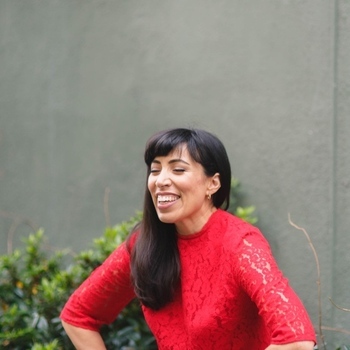
Kathryn Nunez
Introduction
Like most wounded healers I believe in and honor this work because I have experienced the benefits of tending to my own mental and emotional wellness. BACKGROUND & UNDERGRAD Before I became a therapist I made my living as a performer. I have sung, acted, and "danced" (I'm really more of a mover than a dancer, though I love it) in California and overseas. Performing is where I first found my voice and sense of self, which is what drew me to not just eventually become a Licensed Marriage and Family Therapist but to study Drama Therapy and infuse the theatre arts into my therapy practice. My undergraduate degree is in Interdisciplinary Studies with a minor in Critical Psychology, which translates to studying systems (communal, national, and global) and looking at psychology (the way it was constructed, has grown, and is currently practiced) through a decolonizing lens. I will be a forever student of how systems oppress and uplift, enable and stunt, and will work along with my clients to unlearn how my own functioning is harmful or unhealthy to then learn how to better be healing and healthy. As a mixed-race Mexican American woman, I understand what it's like to be both and neither and appreciate unpacking the very real and complex experience of BIPOC. GRADUATE SCHOOL & TRAINING In my Drama Therapy program we were expected to do a pre-practicum in addition to the normal practicum most therapy grad students are required to participate in. This is so that we could see the embodied work in action to best support our learning and ability to do Drama Therapy when in our practicums. My practicum was through Shakespeare for Social Justice at San Quentin State Prison. I worked with men there as a co-facilitator, choreographer, actor, and therapist. After assisting with and performing in their presentation of The Tempest I stayed for another semester at the request of the men to perform in their parallel plays, which are short plays, scenes, or songs written by the men, and are often autobiographical. Marin Shakespeare then hired me to help introduce the Shakespeare for Social Justice program into the California Health Care Facility, a state prison for incarcerated patients with long-term medical or acute mental health needs. For my practicum I was a part of an Expressive Arts program at California Pacific Medical Center in the skilled nursing unit where I worked with patients of all different socioeconomic backgrounds as well as a wide range of aged adults. Through that program I also worked in the Alzheimer's residence. My time at both my pre-practicum and practicum prepared me to believe in my clients and offer unconditional positive regard no matter their background or current health status. I learned that this work is heartbreaking and an honor to be a part of. POST GRAD WORK, MY WORK, OUR WORK After graduate school I was hired by Paradigm Treatment to work in their adolescent residential treatment program and worked as a primary therapist for some time before they asked me to open up their young adult program where I eventually became the lead family therapist. Last year I began training in Eye Movement Desensitization and Reprocessing (EMDR) and will continuing that training and education since it is such a beneficial modality. In the past 3+ years after graduate school I have honed my skills as a clinician and learned so much about being a therapist and about myself. For instance, I learned that working with children and adolescents is not my jam but I love, and am good at, and am at my best when working with young adults, adults, and families! The biggest missing piece for me working in short term residential treatment was how limited my time was with my clients. I look forward to being a part of the long term for people in their healing and growth process. I have experience working with trauma, PTSD, depression, anxiety, unpacking childhood pain as it is held and experienced by adults, understanding issues specific to women, BIPOC, and LGBTQ+ communities and working with families to better understanding the functioning and dysfunction of the family system. ...TO WRAP IT UP I'm pretty good at what I do. I can be challenging and I believe in my clients, which I do my best to make sure they feel. I also acknowledge that just because I am a good therapist does not mean that I am a good therapist for you, but the only way we will find that out is by meeting. If after an initial meeting you are interested in trying therapy I ask that you commit to a month (four sessions) and then after a month, we will check-in, and if we are a good fit I ask that you commit to six months of working together. I'm hoping to have long term therapeutic relationships that might take breaks from time to time and benefit my clients by being there consistently, potentially for years. The work is long and complex and I think everyone deserves to invest in themselves. I currently am accepting new clients and will be meeting via telehealth for the foreseeable future. I can see anyone in the state of California.
Connect
View websiteHighlights
- Accepting new clients
- Available on nights
- Offers free consultation
- Telehealth appointments
- Accepts online payments
Licenses
-
LMFT #128300 (CA)
Specialties
Additional focus areas
Treatment Approaches
Population focus
Appointment types
- Individuals
- Families
- Groups
- Coaching
Communities
-
Racial Justice/Equity
-
Feminism
-
Mixed Race/Multicultural
Age groups
-
Young Adults (18-24)
-
Adults (24+)
-
Elders (65+)
Languages
-
English
Free intro call available
Pay with insurance
Looking for practitioners who accept insurance?
Pay out-of-pocket
-
Fee Description $250 - $350
-
Individual Session (50 min - 80 min) $250 - $300
-
Family Session (80 min - 110 min) $300 - $350
-
Coaching $275 - $325